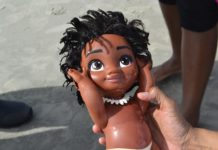When I told some people that I wanted to write about childhood sexuality, they were understandably wary. I wouldn’t touch that with a ten-foot pole, was the way one friend worded it. They were only partially reassured when I promised that I wouldn’t be advocating having sex with children, only acknowledging the inherent sexuality children have from birth.
We have this American cultural paradox where on one hand, we totally sexualize children (see “Toddlers and Tiaras,” the recent kid bikini scandal involving Abercrombie, pole dancing classes for preschoolers, the Bratz dolls, etc.) and on the other hand, we deny them their sexuality, in the form of shaming etc.
It’s not that kids aren’t sexual—infants discovering their genitals is an example and anyone who thinks back probably remembers some peer-related monkey business when they were little—but that their sexuality is different from adult sexuality. It is when adults confuse the two that trouble arises. I’ll give you an example: I’ve seen some great baby make-out sessions in my day. Heck, I’ve had a baby try to make out with me in the last few days, and there is something distinctly uncomfortable about it (the tiny open slobbery mouth, the tongue making a beeline in our direction) because we ascribe adult beliefs on it. The baby is not in fact trying to slip you the tongue.
Kids don’t understand adult sexuality, even when it’s explained to them. My mom told me at age three that in order to make a baby, a penis had to be put into a vagina. I understood, even at that young age, what those things were but when I tried to make it happen a few months later with a similarly aged companion of mine, I told him he should pee in me. Only we couldn’t figure out the positioning. My concept of the world figured peeing what was going on during coitus because all I knew about penises was that they peed. When kids do exhibit signs of understanding adult sexuality, there is actual cause for worry. One sign of sexual abuse is children simulating adult sex acts on toys or on each other.
As adults, we are unable to lift from our eyes the curtain of culture and see our children as they are: both innocent and pleasure seeking—beings trying to understand the world and their place in it. So much of our relationship to sexuality is learned—years of spoken and unsaid messages about how to appropriately express one’s desires. I recently reread my high school journals and revisited my early sexual experiences on the page. It was funny to see from a now adult perspective how young I really was despite my feelings of maturity. Adult terms like “slut” pervade my writing and yet in actuality I was incredibly innocent. At the same time, those experiences, including my early sense of promiscuous identity, help to define my own vision of myself as a sexual being. What happens at thirteen affects the rest of your life.
A quick cultural scan finds the rest of the world similarly conflicted: Do we shelter children or exploit them? Sometimes both? Childhood itself is a much less stable concept than one might think. We’ve created this thing, a child, in a literal sense but also ascribe our own concepts to it. As it grows, we begin to be more and more protective of it. Protection is part of shielding children from sexuality since the helpless nature of childhood means that children are regularly liable to be taken advantage of. Our baser natures are often happily opportunistic.
So what should children see? Are nude beaches ok? Will seeing a senior’s ballsack scar your child for life? My own parents, as liberal as they are, felt uncomfortable taking me to the San Francisco Folsom Street Fair during my pre-pubescent years. Since that fair is the nation’s largest congregation of the fetish community, they had reason—nudity and visible alternative sexuality abounds there. But I treasure my general exposure to the more wild elements of the gay community. Obviously this is a question where an individual family’s belief system decides, but what if we were to try and hash it out in theory with some slight attempt at cultural objectivism?
There are cultures in which families regularly hang out naked together (see Scandinavian saunas and German FKK clubs). There are places people have sex with their kids in the same room and instances where children get married at age nine—heck, even much younger than that. Our concept of childhood sexuality is culturally based. Our concept of childhood as a whole is a product of culture.
What’s the answer? I think, like with many things, we must follow our children’s lead and let their unique sexual identity develop on its own course, at its own pace—a tricky balance, considering it may present itself in the form of your eight year old wanting to dress provocatively. May I suggest, in that situation, a nice long talk about why she wants to wear those clothes with an attempt at real open mindedness on the parent’s part. My parents gave me a copy of Our Bodies, Ourselves, an instructional manual with a progressive bent, at a younger age than some might advise. If I had been less sexually focused I would have left it on the shelves, but since I was obsessed, I spent a lot of time combing through its pages for prurient details. My parents were also unfazed by my rapacious, early and public masturbation and never shamed me about it. I am eternally grateful that they gave me the resources and privacy to educate myself and begin to experiment in a healthy way. All parents would benefit their children to remove shame and fear from parenting.



































I’m not sure why the “poster child” for this article is a black boy wearing a sly look. Given the constant negative press and stereotyping of black boys as deviant, why not go with something a little safer like a little blonde girl wearing a sly look? Why equate something that most parents find uncomfortable like child sexuality with a black boy? Perhaps the parents of cute little blondes might be too uncomfortable to read this article if they saw their daughters staring back at them.
Hi Luci, We appreciate your comment. Point taken. Since we are not a mainstream media publication, that’s not how we saw it. The boy in our view didn’t have a sly or deviant look, but rather a look that said “hey, I’m not sure about this topic.” Since the article is not about deviance (and masturbation in our view is not something that is deviant or sly) we would hope that would not be the connection made. Unlike mainstream media, we hope our magazine has proven that we don’t deal in stereotypes. We believe the content we produce is from a fresh perspective that seeks to break down stereotypes as our mission is to contribute to greater understanding across cultures.
Finally, in illustrating it, we were aiming for an innocuous photo of a child who was not wearing an alluring expression, and rather one that expressed uncertainty of the topic, regardless of the child’s color.
You sound like someone I wouldn’t allow children to be near. You need to get some counseling. Have you no idea that there are child sexual predators? Too much freedom gives children license to become sexual predators.
Great article! I find it so ironic in the states that we are so focused on the gender roles of children and creating independent children that we forget that the topic of sex isn’t something that we just get to choose when to discuss it. It’s always part of our children and the sooner we discuss it, in age appropriate ways of course, the easier we can create a safe place for discussion. No wonder so many kids are embarrassed to discuss sexuality when parents wait until their children are teenagers to bring up the topic. Great article!